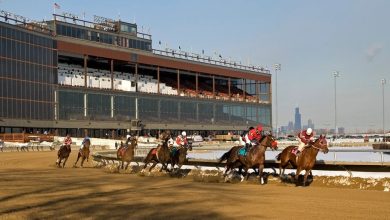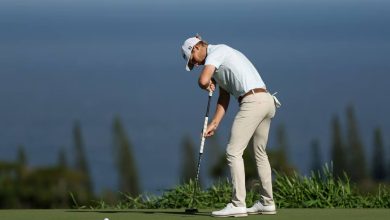Colorado Tribe Sues State, Governor Over Sports activities Betting Rollout

A Native American tribe in Colorado that holds a Class III gaming compact with the state is suing Gov. Jared Polis (D) and Colorado Gaming Division Director Christopher Schroder for a way they rolled out sports activities betting in The Centennial State.
An commercial for the now-defunct on-line Sky Ute Sportsbook. The tribe behind the web wagering platform is suing Colorado Gov. Jared Polis and the state’s gaming regulatory company for not negotiating in good religion with the tribe for it to achieve on-line sports activities betting market entry. (Picture: Southern Ute On line casino Resort)
In a federal lawsuit filed in Colorado’s US District Court docket, the Southern Ute Indian Tribe alleges that Polis and Schroder, and their respective administration and company, failed to barter in good religion as required by the Indian Gaming Regulatory Act (IGRA).
After Colorado voters narrowly authorized a sports activities betting referendum in November 2019, the tribe mentioned it started creating its sports activities betting technique. Attorneys for the Southern Utes contend within the criticism that the tribe sought to work with Polis and the gaming regulatory company in preparation for its retail and on-line sportsbook debut.
The litigation claims the state offered no considerations to the tribe within the months main as much as the Might 2020, begin of on-line sports activities playing. However simply weeks later, the Colorado Division of Gaming (CODOG) despatched a letter dated June 16, 2020, to US Bookmaking, the tribe’s business-to-business sportsbook accomplice that powered its odds and operations, that its facilitating of on-line bets on the tribe’s behalf was unlawful.
Threatened with revocation of its vendor working license within the state, US Bookmaking suspended the net Sky Ute Sportsbook. The tribe shuttered its retail sportsbook at its Sky Ute On line casino Resort in July 2023, after figuring out that it wasn’t making sufficient cash.
Litigation Claims Cash Fueled State’s Actions
The Southern Ute Indian Tribe’s lawsuit says Polis’ motivation to chop the tribe out of the Colorado on-line sports activities betting market was due to tax income.
Whereas Colorado’s 19 licensed sportsbooks have agreed to pay 10% of their gross sportsbook income to the state, the Southern Utes argued that they’re legally entitled to retain 100% of their on-line sportsbook earnings. In contrast to most different states which have entered into Class III gaming compacts with their federally acknowledged tribes to permit their Indian casinos to supply Las Vegas-style slot machines and reside seller desk video games, Colorado’s compacts haven’t included revenue-sharing provisions.
CODOG despatched the same letter to the Ute Mountain Ute’s on-line sportsbook supplier, IGT, on the identical date. IGT additionally shuttered the net sportsbook it had run on the tribe’s behalf.
Southern Ute legal professionals say the governor and Colorado Fee of Indian Affairs in October 2021, lastly agreed to take a seat down with the tribe and Ute Mountain Ute Tribe for a “formal session” concerning statewide tribal sports activities betting. However by that point, the Southern Ute Indian Tribe says the net sports activities betting platforms had secured the market and solidified their buyer bases.
At that time, the Colorado sports activities betting market was already saturated and the Tribe had been wrongly frozen out of the chance to take part in it by the Polis Administration,” the lawsuit contends. “The session was an after-the-fact charade placed on by the State after the Governor had secured a monopoly of non-Tribal gaming enterprises.”
The Polis administration and CODOG, the Southern Ute lawsuit says, have been advantageous with permitting the tribes to function in-person sportsbooks at their tribal casinos however demanded 10% of their on-line sportsbook income. The governor and gaming company additionally advised the tribes {that a} situation of working an internet sportsbook with bets being accepted from nonsovereign lands can be that they’d be subjected to CODOG’s regulatory oversight.
“The Tribe has been efficiently working its personal gaming for 30 years with out incident, together with its different profitable, extremely regulated industrial enterprises,” the go well with declared. “There isn’t any foundation for the State to suggest that the Tribe just isn’t absolutely able to regulating its personal companies pursuant to Tribal and federal legal guidelines.”
Seminole Ruling Cited
The Southern Ute’s sports activities betting lawsuit comes after the US Supreme Court docket in June upheld decrease courts’ rulings that Florida Gov. Ron DeSantis’ (R) Class III compact reached in 2021 with the Seminole Tribe that offered the Arduous Rock proprietor with the unique rights to on-line sports activities betting within the Sunshine State didn’t violate the IGRA. Plaintiffs argued that the Seminoles’ accepting of sports activities bets on-line violated the federal Indian gaming legislation, which regulates gaming actions on tribal lands.
Decrease federal courts agreed with the US Division of the Inside that because the guess isn’t accepted till the information is transmitted to a sportsbook pc server residing on Seminole land, the guess isn’t in violation of the IGRA. The Southern Ute’s criticism cites the federal courtroom’s rulings.
There’s nothing within the textual content or construction of IGRA that might prohibit a tribal-state gaming compact from authorizing on-line sports activities betting that might allow prospects to entry sports activities betting amenities positioned on a tribe’s reservation from private gadgets positioned elsewhere or to in any other case increase tribal sovereignty and authority past what is remitted by IGRA,” the lawsuit learn with a quotation to the Seminole case.
The lawsuit asks the federal district courtroom to declare the tribe’s on-line sportsbook lawful, to direct the state to cease violating the Southern Ute’s Gaming Compact, and to award monetary damages.





